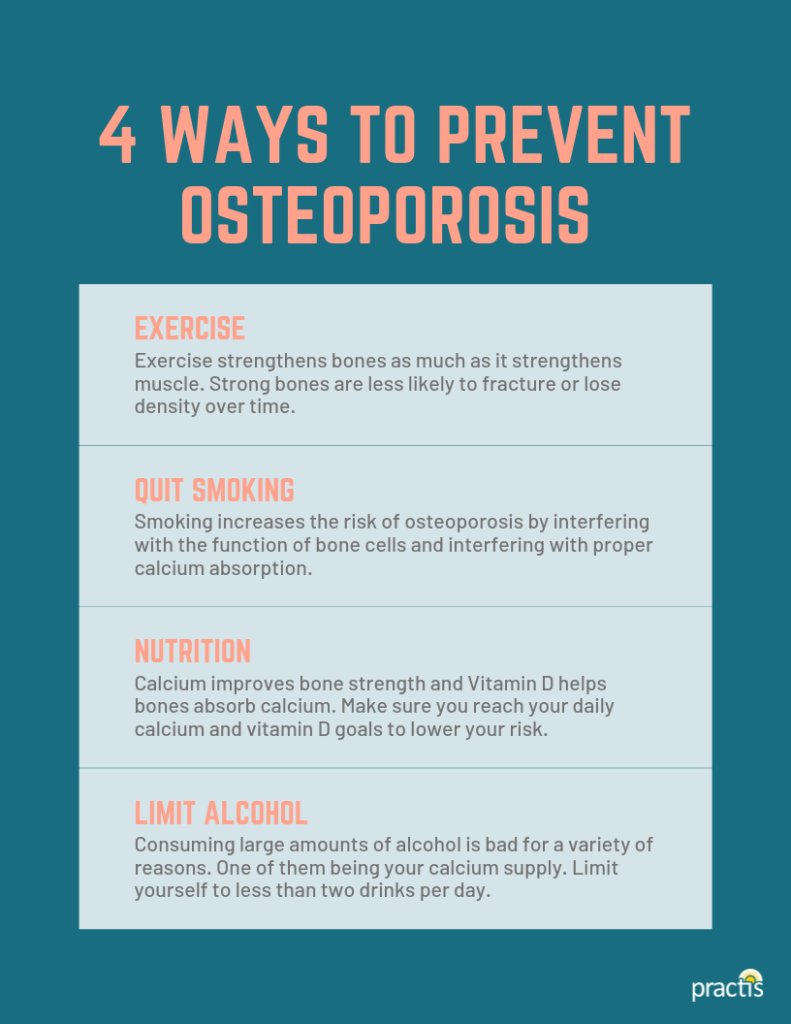
Are you concerned about protecting your bones and preventing the onset of osteoporosis? In this article, we will explore some practical tips and strategies that you can incorporate into your lifestyle to help prevent this common condition. With a focus on maintaining a healthy diet, engaging in regular exercise, and making smart lifestyle choices, you can take proactive steps to safeguard your bone health and reduce the risk of osteoporosis as you age. So let’s delve into some simple yet effective ways to protect your bones and keep them strong and resilient. Osteoporosis is a condition characterized by weakened bones, making them more prone to fractures and breaks. While it is more common in older adults, it is never too early to start taking steps to prevent osteoporosis and maintain strong and healthy bones. By making some simple lifestyle changes and incorporating certain habits into your daily routine, you can significantly reduce your risk of developing osteoporosis. In this article, we will explore various strategies to help you prevent osteoporosis and keep your bones strong.
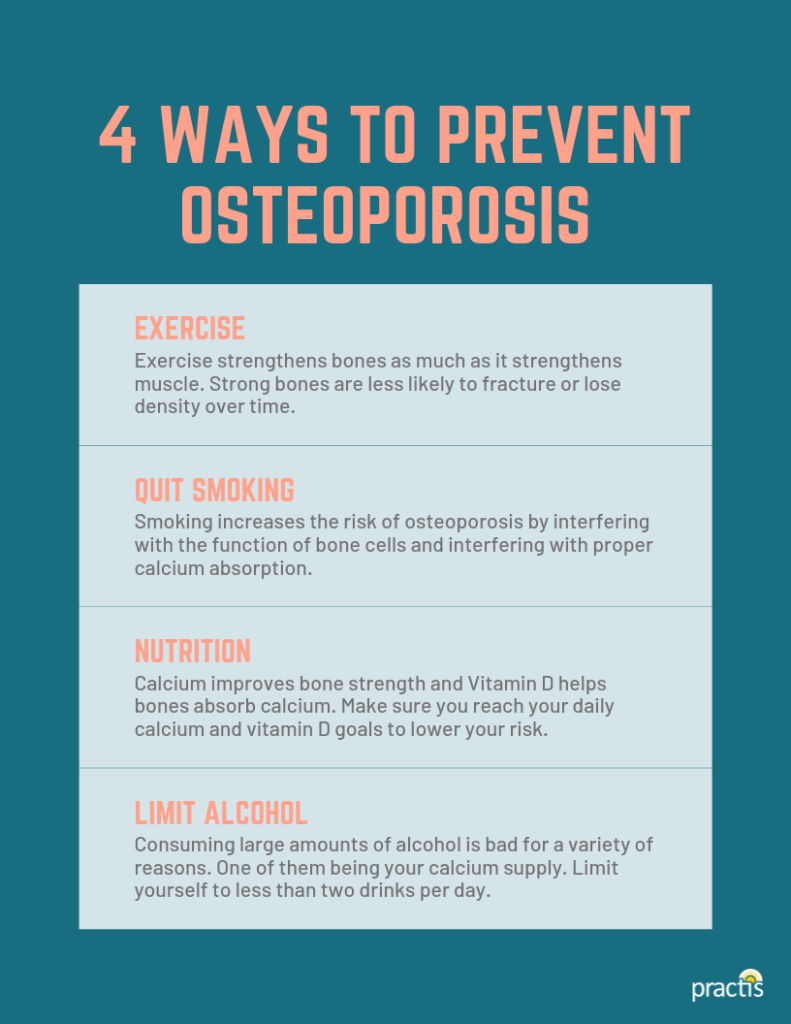
This image is property of gwcradiology.com.
Maintain a Healthy Diet
Your diet plays a crucial role in maintaining strong bones and preventing osteoporosis. Consuming foods rich in calcium, adequate vitamin D intake, and including magnesium in your diet are all essential components of a bone-healthy diet.
Consume Calcium-Rich Foods
Calcium is one of the key nutrients required for strong bones. It is important to consume calcium-rich foods regularly to meet your daily calcium requirements. Dairy products like milk, cheese, and yogurt are excellent sources of calcium. Additionally, green leafy vegetables such as kale, broccoli, and spinach, as well as fortified cereals and tofu, are also great sources of calcium. Incorporating these foods into your diet will help ensure that you are getting enough calcium to support your bone health.
Ensure Adequate Vitamin D Intake
Vitamin D is essential for calcium absorption and plays a vital role in maintaining bone health. The best source of vitamin D is sunlight, so make sure to spend some time outdoors each day to allow your body to naturally produce vitamin D. However, it can be difficult to obtain enough vitamin D solely through sunlight, especially during winter months or if you live in a region with limited sunlight. In such cases, considering vitamin D supplements or consuming foods fortified with vitamin D, such as fatty fish, eggs, and fortified dairy products, can help you meet your daily vitamin D requirements.
Include Magnesium in Your Diet
Magnesium is another mineral that is crucial for maintaining strong bones. It works hand in hand with calcium and vitamin D to support bone health. Good sources of magnesium include nuts, seeds, whole grains, legumes, and leafy green vegetables. Incorporating these foods into your diet will not only benefit your overall health but also contribute to the prevention of osteoporosis.
Get Sufficient Protein
Protein is not only important for muscle development and repair but also plays a role in maintaining bone health. Including adequate amounts of protein in your diet can help support bone strength and prevent the loss of bone mass. Good sources of protein include lean meats, poultry, fish, eggs, dairy products, legumes, and nuts. Ensuring that you have a balanced diet with sufficient amounts of protein will contribute to the overall health of your bones.
Engage in Regular Exercise
Physical activity is essential for maintaining optimal bone health. Engaging in regular exercise can help improve bone mineral density and strength. It is recommended to incorporate a variety of exercises into your routine, including weight-bearing exercises, strength training, and exercises that focus on balance and posture.
Include Weight-Bearing Exercises
Weight-bearing exercises involve activities that require you to support your body weight. These exercises stimulate bone remodeling, which helps in maintaining bone density and strength. Examples of weight-bearing exercises include walking, jogging, dancing, stair climbing, and playing tennis. Aim for at least 30 minutes of weight-bearing exercise most days of the week to reap the maximum benefits for your bone health.
Incorporate Strength Training
Strength training exercises involve using resistance to build muscle strength. These exercises not only help increase muscle mass but also exert stress on the bones, stimulating them to become stronger. Examples of strength training exercises include lifting weights, using resistance bands, or performing bodyweight exercises such as squats and push-ups. Aim to include strength training exercises at least two to three times per week, working all major muscle groups.
Don’t Forget Balance and Posture Exercises
In addition to weight-bearing and strength training exercises, it is important to include exercises that promote balance and good posture. These exercises help improve stability and reduce the risk of falls, which can lead to fractures in individuals with osteoporosis. Examples of balance and posture exercises include yoga, tai chi, and specific balance exercises like standing on one leg or heel-to-toe walking. Aim to include these exercises regularly to improve your balance and posture, reducing your risk of falls and injuries.
Limit Alcohol Consumption
While moderate alcohol consumption may not pose significant risks to bone health, excessive and prolonged alcohol intake can weaken bones and increase the risk of fractures. It is important to understand safe alcohol limits and avoid binge drinking.
Understand Safe Alcohol Limits
The recommended safe limit for alcohol consumption varies depending on gender and age. For women, it is generally recommended to limit alcohol intake to one drink per day, while for men, it is recommended to limit it to two drinks per day. It is important to note that excessive alcohol consumption can interfere with the body’s ability to absorb and utilize calcium, leading to weakened bones.
Avoid Binge Drinking
Binge drinking, defined as consuming four or more drinks in a short period for women and five or more drinks for men, can have a detrimental effect on bone health. Binge drinking not only increases the risk of accidents and falls but also interferes with the body’s ability to absorb essential nutrients like calcium, leading to weakened bones. It is crucial to avoid binge drinking and consume alcohol in moderation to protect your bone health.
Quit Smoking
Smoking is known to have numerous negative effects on overall health, and its impact on bone health should not be underestimated. Smoking can lead to decreased bone mass and a higher risk of fractures. Quitting smoking is an important step in preventing osteoporosis and maintaining optimal bone health.
Recognize the Negative Effects of Smoking
Smoking affects bone health in multiple ways. Firstly, it decreases the absorption of calcium, a vital nutrient for maintaining strong bones. Secondly, it accelerates the breakdown of bone tissue, leading to decreased bone density. Additionally, smoking is associated with decreased levels of estrogen, a hormone that plays a critical role in maintaining bone health, especially in women. Understanding and recognizing these negative effects of smoking on bone health is crucial in motivating you to quit.
Seek Support to Quit Smoking
Quitting smoking can be challenging, but remember, you don’t have to do it alone. Seeking support from healthcare professionals, friends, or support groups can greatly increase your chances of successfully quitting. They can provide guidance, resources, and strategies to help you overcome cravings and manage withdrawal symptoms. The sooner you quit smoking, the better chance you have of preventing further damage to your bones and improving your overall health.
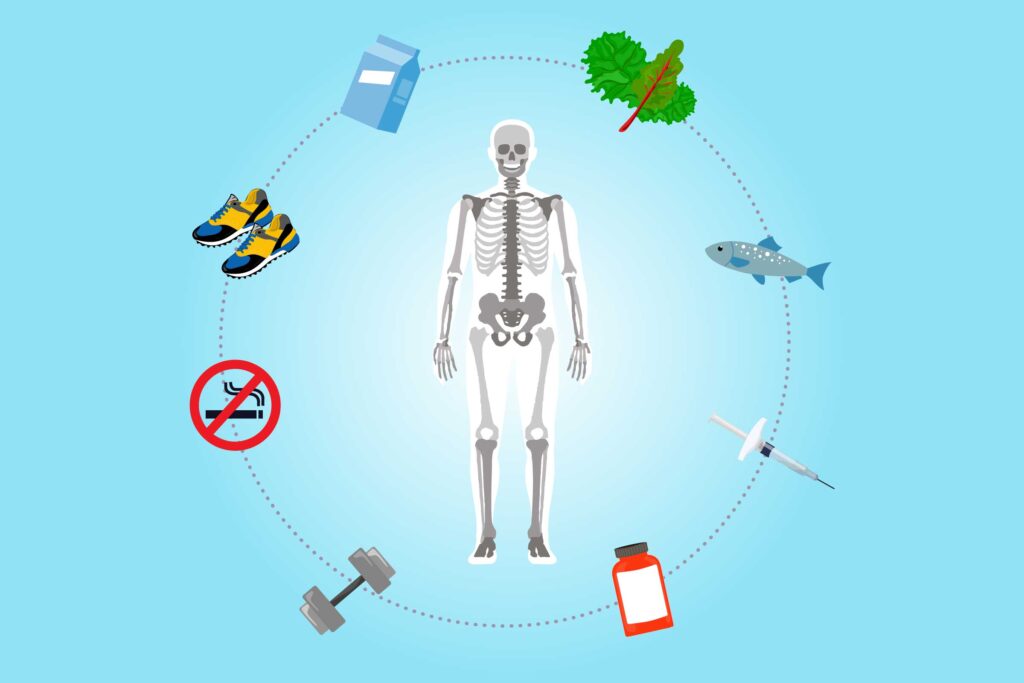
This image is property of creakyjoints.org.
Maintain a Healthy Body Weight
Maintaining a healthy body weight is important for overall health and plays a role in preserving bone health. Both excessive weight loss and significant weight gain can negatively impact bone health, so it is essential to find a balance and manage your weight effectively.
Control Your Body Mass Index (BMI)
Body Mass Index (BMI) is a measure that assesses your weight in relation to your height. It is an indicator of whether you are underweight, overweight, or within a healthy weight range. Maintaining a BMI within the healthy range (18.5 to 24.9) is beneficial for bone health. However, it is important to keep in mind that BMI is just one indicator, and it is essential to focus on overall health and body composition rather than solely relying on this measure.
Avoid Excessive Weight Loss
Significant weight loss, especially through crash diets or extreme calorie restriction, can lead to decreased bone density and an increased risk of osteoporosis. To prevent bone loss, it is important to take a balanced approach to weight loss, focusing on a combination of healthy eating, regular physical activity, and gradual, sustainable weight loss. Aim to lose weight slowly and steadily, ensuring that you are still getting adequate nutrients to support your bone health.
Manage Weight Gain Effectively
Excessive weight gain, particularly in the form of visceral fat (fat around the abdomen), can also negatively impact bone health. It is important to manage weight gain effectively through a combination of healthy eating, regular exercise, and maintaining a balanced lifestyle. Aim to maintain a healthy body weight by adopting lifestyle habits that promote overall health, and consult with a healthcare professional or nutritionist if you need support in managing your weight effectively.
Prevent Falls and Injuries
Preventing falls and injuries is crucial in reducing the risk of fractures, especially in individuals with osteoporosis. Making your home safer, using assistive devices when necessary, and being proactive in fall prevention can greatly reduce your risk of falls and injuries.
Make Your Home Safer
Take measures to make your home safer and reduce the risk of falls. Ensure that areas are well-lit, remove any tripping hazards such as loose rugs or clutter, install grab bars in the bathroom, and use non-slip mats in the shower or bathtub. Staircases should have handrails, and slippery surfaces like stairs or polished floors can be made safer by using grip strips or nonslip footwear. Making these modifications to your home environment can help create a safer living space and reduce the risk of falls.
Use Assistive Devices When Necessary
If you have mobility issues or are at a higher risk of falls, consider using assistive devices such as canes, walkers, or grab bars to support your stability and prevent falls. These devices can provide additional support and help maintain your balance, reducing the risk of fractures in individuals with osteoporosis. Consult with a healthcare professional or occupational therapist to determine which assistive devices would be most suitable for your needs.
Be Proactive in Preventing Falls
In addition to modifying your home environment and using assistive devices, being proactive in fall prevention is crucial. This includes staying physically active to maintain strength and balance, avoiding rushing or engaging in activities that require quick movements, wearing appropriate footwear with nonslip soles, and taking necessary precautions when walking on slippery surfaces. Being mindful of your surroundings and taking preventive measures can greatly reduce the likelihood of falls and injuries.
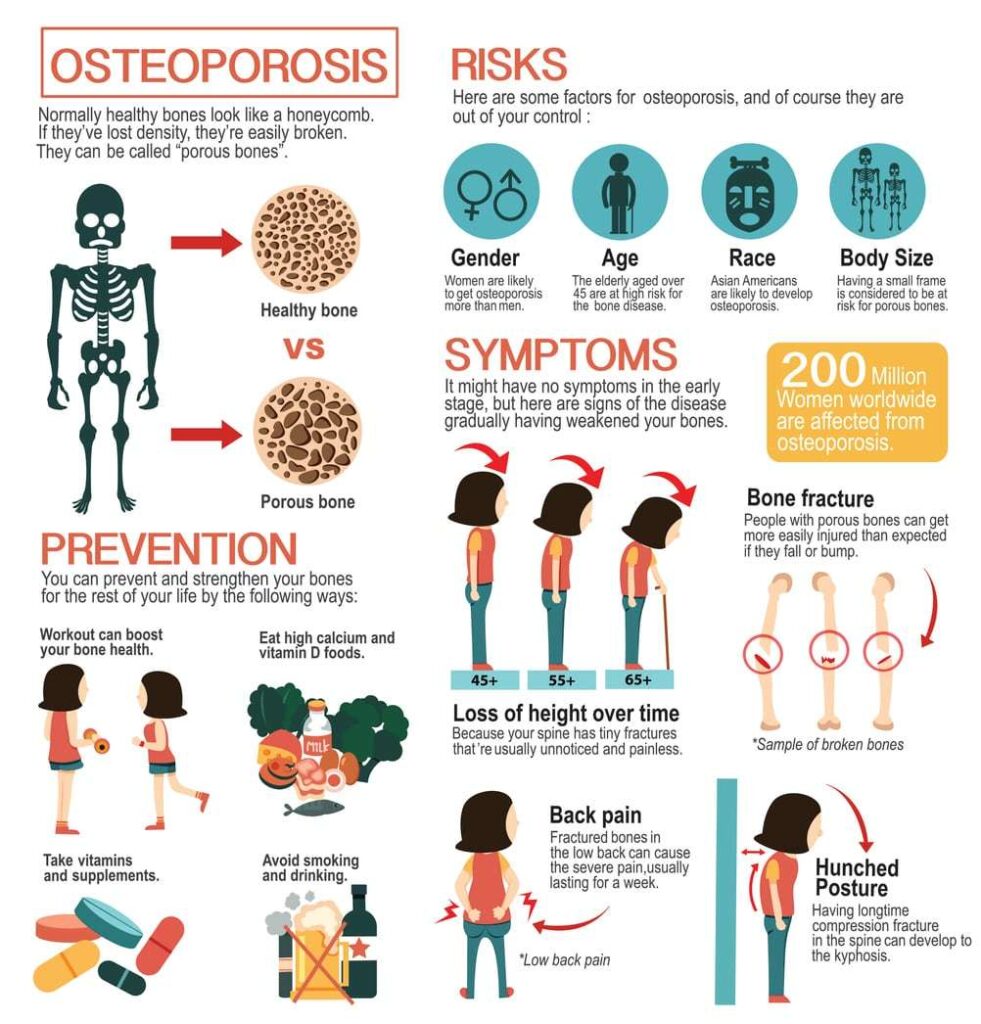
This image is property of twc-ms.com.
Ensure Hormonal Health
Hormonal changes can significantly impact bone health, especially in women. Managing menopause effectively and discussing hormone replacement therapy (HRT) with your doctor can help mitigate the negative effects of hormonal changes on bone health.
Manage Menopause Effectively
During menopause, estrogen levels decline, leading to a higher risk of bone loss and osteoporosis. Managing menopause effectively can help minimize the impact on bone health. This includes adopting a bone-healthy diet, engaging in regular weight-bearing and strength training exercises, and discussing potential hormone therapy options with your healthcare provider.
Discuss Hormone Replacement Therapy (HRT) with Your Doctor
Hormone replacement therapy (HRT) involves taking medications that contain hormones to replace those that your body no longer produces in sufficient amounts. HRT can help alleviate menopause symptoms and protect against bone loss. However, it is important to discuss the benefits and risks of HRT with your doctor, as individual circumstances and medical history can influence the suitability and appropriateness of hormone therapy.
Consider Medications or Supplements
In certain cases, medications or supplements may be recommended to support bone health. However, it is essential to discuss these options with your doctor to understand the potential benefits and risks associated with them.
Discuss Medication Options with Your Doctor
If you have a high risk of osteoporosis or already have osteoporosis, your doctor may recommend specific medications called bisphosphonates, which can help slow down bone loss and reduce the risk of fractures. However, it is important to discuss the potential benefits and risks of such medications with your doctor, as they can have side effects and may not be suitable for everyone.
Explore Calcium and Vitamin D Supplements
If you are unable to meet your daily calcium and vitamin D requirements through diet alone, your doctor may recommend calcium and vitamin D supplements. These supplements can be beneficial in ensuring you are getting enough of these essential nutrients to support your bone health. It is important to discuss the appropriate dosage and any potential interactions with other medications or medical conditions with your doctor before starting any supplements.
Understand the Benefits and Risks
Before considering any medications or supplements, it is crucial to understand the potential benefits and risks. Each individual’s circumstances and medical history are unique, and what may be suitable for one person may not be appropriate for another. Furthermore, it is important to discuss any potential interactions with other medications or medical conditions with your doctor to ensure that the chosen treatment approach is safe and effective for you.
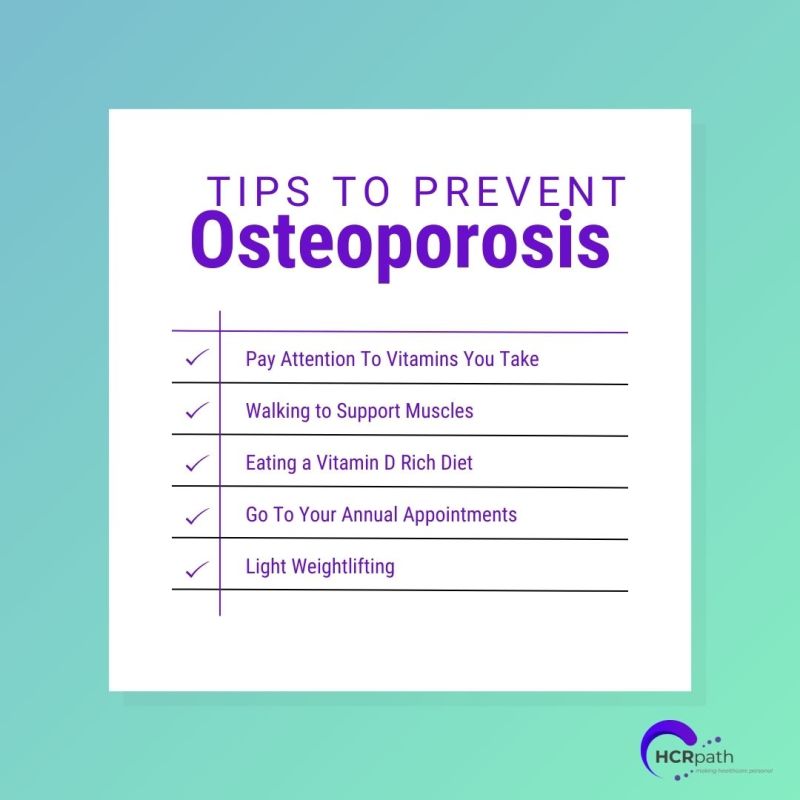
This image is property of www.hcrpath.com.
Get Regular Bone Density Tests
Regular bone density tests are an integral part of preventing osteoporosis, as they can help detect bone loss early and guide appropriate interventions. Understanding when to start testing, following the recommended testing schedule, and discussing the results with your doctor are all important aspects of bone density testing.
Know When to Start Testing
The age at which bone density testing should begin varies depending on individual risk factors. In general, testing is recommended for women aged 65 and older and men aged 70 and older. However, if you have specific risk factors or medical conditions that increase your risk of osteoporosis, your doctor may recommend earlier testing. It is important to discuss your personal risk factors and medical history with your doctor to determine when to start testing.
Follow Recommended Testing Schedule
Bone density testing is typically performed using a specialized machine called a dual-energy X-ray absorptiometry (DXA) scanner. The test is painless and involves lying on a table while the machine scans your bones. The results are usually given as a T-score, which compares your bone density to that of a healthy young adult of the same gender. Based on the results, your doctor will determine the appropriate testing schedule for future screenings. Generally, repeat testing is recommended every two years to monitor changes in bone density effectively.
Discuss Results with Your Doctor
Once you have received your bone density test results, it is important to discuss them with your doctor. They will be able to interpret the results, provide recommendations tailored to your specific situation, and discuss any necessary interventions or treatments. Understanding your bone density test results and following up with your doctor’s recommendations is crucial in preventing and managing osteoporosis effectively.
Educate Yourself and Seek Professional Advice
Staying informed about osteoporosis, consulting with your healthcare team, and seeking support from support groups or programs can provide valuable knowledge and guidance in preventing osteoporosis and maintaining optimal bone health.
Stay Informed About Osteoporosis
Educate yourself about osteoporosis by reading reputable sources of information, attending educational seminars or webinars, and staying up to date with the latest research. Understanding the risk factors, prevention strategies, and treatment options for osteoporosis will empower you to make informed decisions about your bone health.
Consult with Your Healthcare Team
Your healthcare team, including your doctor, dietitian, and physical therapist, is an important resource in preventing osteoporosis. They can provide personalized advice, guidance, and support based on your individual needs and medical history. Regular check-ups and open communication with your healthcare team will help you stay proactive in maintaining your bone health.
Join Support Groups or Programs
Joining support groups or participating in programs specifically focused on osteoporosis can provide you with a supportive and informative environment. These groups and programs often offer resources, educational materials, and opportunities to connect with others who share a similar experience. Sharing your journey, concerns, and successes with others can provide a sense of community and encouragement throughout your osteoporosis prevention journey.
In conclusion, preventing osteoporosis is a proactive journey that involves maintaining a healthy diet, engaging in regular exercise, limiting alcohol consumption, quitting smoking, maintaining a healthy body weight, preventing falls and injuries, ensuring hormonal health, considering medications or supplements, getting regular bone density tests, and educating yourself while seeking professional advice. By implementing these strategies and making bone health a priority, you can reduce your risk of developing osteoporosis and enjoy a life with strong and healthy bones. Remember, it is never too early to start taking care of your bones, so start making these positive changes today!
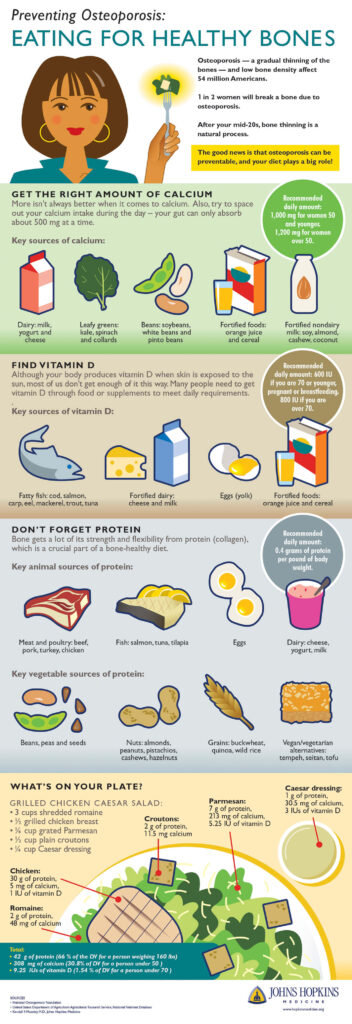
This image is property of www.hopkinsmedicine.org.